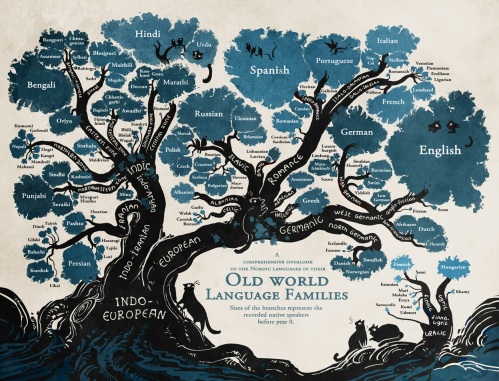Author’s Note: I am not a professional etymologist (one who studies words, not bugs. That’s entomologist). What follows is my understanding of the cider etymology and the history of the word “cider.”
I was curious, where does cider come from? Not the drink, the word. The Online Etymology Dictionary, Dictionary.com, An Etymological Dictionary of Modern English (see entry for “cider”), and R.K. French’s The History and Virtues of Cyder (page 11) all share a similar line of descent – from Hebrew to Greek to Latin to French to English.

The roots of English are nowhere as neat as this image shows. Source
Usually when everyone agrees on something like this, I feel the need to dig deeper. So I did. While the general overview seems solid, things are a little messier than is often recognized.
Starting with modern English and working backwards through time, the cider etymology looks like this:
Cider
Modern English
⇓
Cidre / Sidre
Middle English, After 1066 to 15th century
Originally, strong drink; by mid-14th century alcoholic apple or pear juice
⇓
Cidre / Sidre
Old French, 8th – 14th Centuries 12th Century
Alcoholic pear or apple juice
⇓
Cisdre
Old French, Appears to be transition between Latin and later French
Alcoholic pear or apple juice
⇓
Sīcera
Late Latin, 3rd – 6th Centuries CE
Strong Drink
Related to Cisara / Cisera
Latin, Uncertain Origin
Cider
In all of the above Latin words each C is pronounced with a hard K-sound (si-kera)
⇓
Sikera – σίκερα
Greek, 3rd – 2nd Century BCE
Strong Drink
⇓
Shekhar – שֵׁכָר
Hebrew, 8th – 6th Century BCE
Strong Drink
Sakar – سَكَر is Arabic for strong drink. It appears in the Quran and other early Islamic texts. It’s related to shekhar, but it’s unclear if it’s the root or the descendant.
There is a question over which came first in English, the Latin or the French influence. As noted above, many overviews suggest that the English word “cider” is descended from the French. However, there’s some evidence for a direct Latin root.
In 1895 Sir George Birdwood (great name, ain’t it?) presented a paper on the various spellings of cider, which led him to review its etymology. After listing his evidence, he said, “These clearly proved that the word cyder, syder, or cider came, not only through the French cidre, but direct from the “sicera.” For Birdwood, this was evidence that the Latin form of it was older than French.”
There is some support for this Latin first idea. In 1857 Joseph Mayer published A Library of National Antiquities, Volume I: A Volume of Vocabularies. In it he transcribed early English (Anglo-Saxon) glossaries, three of which have the Latin we’ve seen above, including:
Sicera – “Archbishop Alfie’s Vocabulary,” 10th century
Cicera – “Semi-Saxon Vocabulary,” 12th century
Scicera – “The Treatise de Utensilibus of Alexander Neckam,” 12th century
While a Latin root for the English word cider remains debatable, these early glossaries suggest that the Latin for cider may have preceded and then been concurrent with the French in some places in England before dropping out of use entirely.
Next time we’ll look at the various spellings, or orthography, of the English word for alcoholic apple juice through time.
